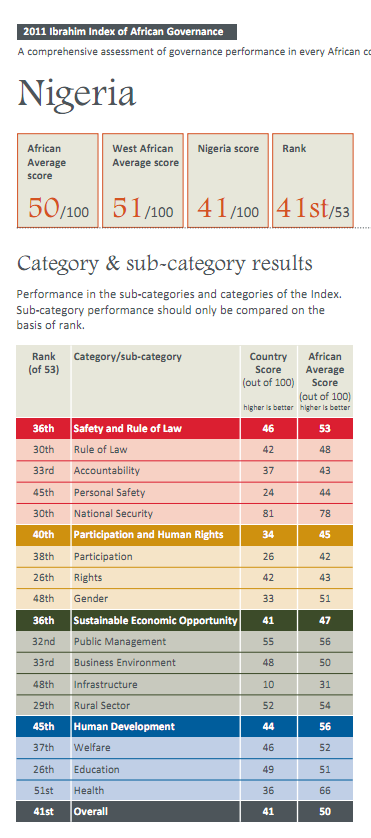There are many reasons we should be paying a lot of attention to the Mo Ibrahim Foundation. It is funded and led by an African institution, and is Africa’s leading assessment of governance. The Foundation provides a framework and tools for citizens, public authorities and partners to assess progress in governance. It compiles 86 indicators grouped into 14 sub-categories and four overarching competencies to measure the effective delivery of public goods and services to African citizens, using indicators from 23 data providers.
Maybe it is time we “woke up and smelt the coffee”, seen as when we are benched against other African countries, we are at the bottom of the pile. I remember being in Harare, Zimbabwe in 2006, at the height of the crisis in that country. Despite all the political turmoil going on, ambulances still worked. In Nigeria, we have ‘normalised’ a disastrous situation in the health sector, one in which no one has any confidence in the public healthcare facilities, rich or poor. Scratching around at the edges will not help either. If our leaders have the courage to carry out a Sanusi Lamido like exposure of our health sector, will we come to terms with the extent on the challenges in the sector. We can do better, and it is not just us saying it at Nigeria Health Watch.
And if you do not trust the Mo Ibrahim Foundation, we invite you to visit the World Banks’s Africa Development Indicators 2011, the most detailed collection of data on Africa. It contains macroeconomic, sectoral, and social indicators for 53 countries. It is a reliable dataset for monitoring development programs and aid flows in the region and an invaluable tool for analysts and policy makers.
To know how bad things are, we must benchmark ourselves with other African countries….maybe then, the penny will drop. The health sector in Nigeria requires nothing short of radical transformation. This will turn the sector into one that truly serves the best interests of the Nigerian people. Again, scratching around the edges will not help……
Reporting 7 – 8% GDP growth in Nigeria means absolutely nothing to the “ordinary” Nigerian if this is not reflected in the quality of service provision to the citizens. It will remain a figure reported on the pages of news papers until it affects peoples’ lives.
However, we will not get the transformation we seek by sitting on our backsides. We will continue to have the health service we deserve… until we do something about it!
http://www.nigeriahealthwatch.com/
Never doubt that a small group of thoughtful committed people can change the world; indeed it is the only thing that ever has…Margaret Mead



